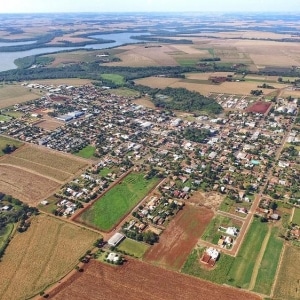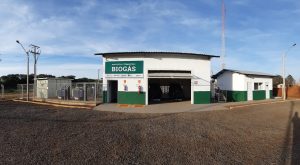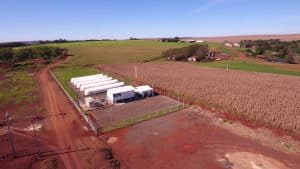
Guaranteed price delivers biogas infrastructure
– 20,6km pipeline connects 18 farms to city
– 72 municipal buildings powered by biogas in net metering model
– City saving over 10% on energy bills
The city of Entre Rios do Oeste, in the interior of the state of Paraná, south of Brazil, has traditionally been known for two things – being home to more pigs than people and its water sports facilities, which reflects its proximity to the Parana river and associated creeks.
Now, however, the city is receiving attention for its progressive green energy policy, which has set a benchmark for sustainability and exemplifies how anaerobic digestion and biogas can sit at the heart of the circular economy.
The reason is the opening of an unprecedented mini biogas power plant and localised gas grid, which supplies the city’s 72 municipal buildings with electricity generated from biogas created from pig manures on 18 local farms. A key catalyst for the deal was City Hall offering a guaranteed price for the biogas.
The pioneering network sets a blueprint for locations where there isn’t an established natural gas grid.
Rodrigo Regis de Almeida Galvão is the CEO of CIBiogás (the International Center for Renewable Energy) which played an instrumental role in delivering the deal. CIBiogás is a scientific, technological and innovation institution that promotes the management of organic waste as a renewable energy source.
“While the largest consumption of natural gas and large gas pipelines are across the Brazilian coastline, the great potential for biogas production in Brazil is in the countryside. Brazil has expanded the use of biogas as a dispatchable and renewable energy source. CIBiogás estimates that biogas has the potential to meet 36% of Brazil’s electricity demand,” Regis de Almeida Galvão said.
Turning environmental liabilities into energy

Pig breeding is the main economic activity in the Entre Rios do Oeste municipality. With a total swine herd of 155,000, the number of pigs is 32 times greater than the number of inhabitants, 4,900, according to the Agricultural Defense Agency of Paraná (ADAPAR). It makes the municipality the fourth largest producer of pigs in the state of Paraná and 16th largest in Brazil.
Such large-scale pig production naturally creates a lot of manures, which release climate changing methane into the atmosphere, unpleasant odors, and can pose a pollution threat to waterways.
The proposal was supported by local farmers, the Paraná Energy Company (COPEL) and the executors were International Center for Renewable Energies (CIBiogás) and Itaipu Technological Park (PTI).
Once sanctioned by ANEEL, it enabled COPEL to invest R$17 million (US$ 4.4 million) in the Research and Development (RD) project
Localized grid offers potential for growth

The localized grid comprises a 20,6km underground pipeline that connects the 18 participating farmers to a central power plant, two 240kW generators. Five gasometers are used to equalize the dispatch of gas from the properties to the engines.
The municipality assumes responsibility for the maintenance of the pipeline and mini biogas power plant.
The swine herd that currently supplies substrate for the plant is approximately 40,000 strong, generating around 215 tons of manure every day that is transformed in 4.600 m³/day of biogas and 200 m³/day of biofertilizer (both estimated volumes).
Over one month, the biogas yields 250MWh of energy, enough to meet the needs of all public buildings in Entre Rios do Oeste. The arrangement represents a monthly saving of over 10% on the municipality’s energy bills.
All the energy produced is injected into the grid of the local power utility COPEL, which in turn supplies compensation credits to City Hall. The deal was hinged on City Hall offering a guaranteed price for the biogas delivered.
The city envisages that in the future it will be possible to increase the production of energy and biofertilizer, since two thirds of the region’s existing herd has yet to join the biogas supply chain.
‘The greatest gain’
One of the pig farmers participating in the project, Claudinei Stein, says the benefits of having installed a biodigester are the reduction of pollutant gas emissions, savings on fertilisers and also generation of extra income with the sale of biogas to the City Hall.
Aside from the green energy produced, the Entre Rios do Oeste project delivers further benefits. The digestate produced in the anaerobic digestion process is enabling them to reduce spending on chemical fertilizers by up to 30%.
And the herds are healthier. The treatment of manures through anaerobic digestion has diminished the levels of disease within pig herds, ordinarily transmitted by the proliferation of mosquitoes attracted by untreated manures.
Stein took out a loan to build the biodigester and the investment did not discourage him. “The gas production will be enough to pay for my investment during the financing period and there will still be some left over,” he says.
For Entre Rios do Oeste Mayor Jones Heiden, the installation of the Biogas Power Plant is a milestone for the municipality. “With this project we are sure we are contributing to the preservation of the environment, and this is the greatest gain”, he says.
The City also emphasizes how the introduction of the biogas network not only helps the region, but also contributes to delivering on Brazil’s commitments to the UN Sustainable Development Goals (2, 6, 7, 12, 13 and 17).

